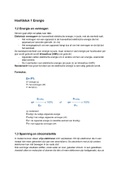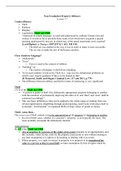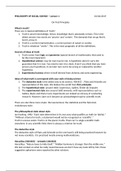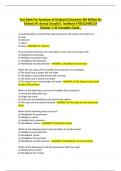The shareholders own the company in the sense they invested their shares in it. They exercise
ultimate control over the company, and they hope to receive a financial return on their
investment. They can exercise their control in two key ways: by determining the company’s
constitution, and by voting on shareholder’s resolution.
Although the directors manage the company on a day-to-day basis, the shareholders reserve the
power to remove a director from the board and to appoint new directors.
Shares
Capital is used to refer to the funds available to run the business of a company. In company law,
the term share capital relates to the money raised by the issue of shares. The share capital is
contributed by the investors in the company and is represented by the shares that are issued to
those investors. Funds are required for provision of rent of the company etc., as well as to keep
the company running; working capital. They are also needed for expansion and growth of the
company. They can be raised by borrowing (debt finance). A share is often described as a bundle
of rights. By investing in the share capital of the company, the investor becomes a part owner of
the company, and will often have voting rights in shareholder meetings. Hence most investors in a
private company usually make a long-term investment, and get their investment back on a sale of
their shares, a sale of the company itself on a flotation or when the company is wound up
provided sufficient funds are available. The incentives of investing shares in a company would be a
receipt of income from that share investment, otherwise known as the dividend, and also capital
gains of which the growth of individual shares is directly proportionate to that of the company.
However, neither is guaranteed. The amount of shares issued at any time is known as the issued
share capital. The issue of shares can be made to subscribers (before the company was
established), as well as to the existing and future shareholders. Newer shares can be issued at any
time provided current procedures are followed.
Allotment of shares is defined in s558 of CA 2006 - when a person acquires the unconditional
right to be included in the company's register of members in respect of the shares. It is a contract
between the company and new, or existing shareholder under which the company agrees to issue
new shares in return for the purchaser paying the subscription price. Hence the allotment comes
first. The term is used interchangeably with the word “issue of shares”, but they carry different
meanings. There is no statutory definition of the latter. However, it had been held that shares can
only be issued once the company has been registered, also only when he (shareholder) has full
title to those shares. s 112 confirms that the legal title is only achievable once the individual’s
name has been entered into the company’s registrar of members. Transfer of shares - contract to
sell existing shares between the existing shareholder and the purchaser. The company is not a
party to the transfer.
Share ownership
Formation of shares - s112
The members of a company
(1) The subscribers of a company's memorandum are deemed to have agreed to become members
of the company, and on its registration become members and must be entered as such in its
register of members.
(2) Every other person who agrees to become a member of a company, and whose name is
entered in its register of members, is a member of the company.
, Glencoe Developments Ltd v Sneddon (2012) - the shares are not legally transferred to the
prospective shareholder until the registrar of members is updated. It is absolutely essential that
the up-to-date register of members is maintained.
One can become a shareholder in one of a number of the following ways :
1. by being an initial subscriber
2. share issued by the company
3. share transferred by the existing shareholder
4. share transmission*
*a mechanism by which the title to share is devolved, other than by transfer e.g devolution of
shares on death of a shareholder, succession, inheritance, bankruptcy, marriage, etc.
Redemption of shares by the company
The company can acquire its own shares, especially if it wants to reduce the capital - Trevor v
Whitworth (1887). Although there is a common law prohibition on a company acquiring its own
shares, s658 expressly permits a limited company to issue shares that are to be redeemed at the
option of the company or the shareholders.
Separation of powers
Directors have control of the company’s day-to-day management, and they necessarily have broad
powers to carry out such management. However, such roles are restricted by statute to ensure
that they do not abuse their power.
- they must disclose information about themselves when dealing with the company
- in many cases, shareholders’ approval must be obtained for transactions
- shareholders make certain fundamental decisions (by amending the articles of association)
Art 70 Table A
Art 3, 4 MAs
Hence the shareholders have ultimate control available by virtue of the voting mechanism of the
articles.
Decision-making
Board of directors will meet, and they have a power to call for general meetings. A general
meeting is a meeting of shareholders. Board meeting-general meeting sandwich.
s 303
(1) The members of a company may require the directors to call a general meeting of the
company.
(2) The directors are required to call a general meeting once the company has received requests to
do so from—
(a) members representing at least 5% of such of the paid-up capital of the company as carries the
right of voting at general meetings of the company
(4) A request—
(a) must state the general nature of the business to be dealt with at the meeting
304 - Directors' duty to call meetings required by members
(1) Directors required under section 303 to call a general meeting of the company must call a
meeting—
ultimate control over the company, and they hope to receive a financial return on their
investment. They can exercise their control in two key ways: by determining the company’s
constitution, and by voting on shareholder’s resolution.
Although the directors manage the company on a day-to-day basis, the shareholders reserve the
power to remove a director from the board and to appoint new directors.
Shares
Capital is used to refer to the funds available to run the business of a company. In company law,
the term share capital relates to the money raised by the issue of shares. The share capital is
contributed by the investors in the company and is represented by the shares that are issued to
those investors. Funds are required for provision of rent of the company etc., as well as to keep
the company running; working capital. They are also needed for expansion and growth of the
company. They can be raised by borrowing (debt finance). A share is often described as a bundle
of rights. By investing in the share capital of the company, the investor becomes a part owner of
the company, and will often have voting rights in shareholder meetings. Hence most investors in a
private company usually make a long-term investment, and get their investment back on a sale of
their shares, a sale of the company itself on a flotation or when the company is wound up
provided sufficient funds are available. The incentives of investing shares in a company would be a
receipt of income from that share investment, otherwise known as the dividend, and also capital
gains of which the growth of individual shares is directly proportionate to that of the company.
However, neither is guaranteed. The amount of shares issued at any time is known as the issued
share capital. The issue of shares can be made to subscribers (before the company was
established), as well as to the existing and future shareholders. Newer shares can be issued at any
time provided current procedures are followed.
Allotment of shares is defined in s558 of CA 2006 - when a person acquires the unconditional
right to be included in the company's register of members in respect of the shares. It is a contract
between the company and new, or existing shareholder under which the company agrees to issue
new shares in return for the purchaser paying the subscription price. Hence the allotment comes
first. The term is used interchangeably with the word “issue of shares”, but they carry different
meanings. There is no statutory definition of the latter. However, it had been held that shares can
only be issued once the company has been registered, also only when he (shareholder) has full
title to those shares. s 112 confirms that the legal title is only achievable once the individual’s
name has been entered into the company’s registrar of members. Transfer of shares - contract to
sell existing shares between the existing shareholder and the purchaser. The company is not a
party to the transfer.
Share ownership
Formation of shares - s112
The members of a company
(1) The subscribers of a company's memorandum are deemed to have agreed to become members
of the company, and on its registration become members and must be entered as such in its
register of members.
(2) Every other person who agrees to become a member of a company, and whose name is
entered in its register of members, is a member of the company.
, Glencoe Developments Ltd v Sneddon (2012) - the shares are not legally transferred to the
prospective shareholder until the registrar of members is updated. It is absolutely essential that
the up-to-date register of members is maintained.
One can become a shareholder in one of a number of the following ways :
1. by being an initial subscriber
2. share issued by the company
3. share transferred by the existing shareholder
4. share transmission*
*a mechanism by which the title to share is devolved, other than by transfer e.g devolution of
shares on death of a shareholder, succession, inheritance, bankruptcy, marriage, etc.
Redemption of shares by the company
The company can acquire its own shares, especially if it wants to reduce the capital - Trevor v
Whitworth (1887). Although there is a common law prohibition on a company acquiring its own
shares, s658 expressly permits a limited company to issue shares that are to be redeemed at the
option of the company or the shareholders.
Separation of powers
Directors have control of the company’s day-to-day management, and they necessarily have broad
powers to carry out such management. However, such roles are restricted by statute to ensure
that they do not abuse their power.
- they must disclose information about themselves when dealing with the company
- in many cases, shareholders’ approval must be obtained for transactions
- shareholders make certain fundamental decisions (by amending the articles of association)
Art 70 Table A
Art 3, 4 MAs
Hence the shareholders have ultimate control available by virtue of the voting mechanism of the
articles.
Decision-making
Board of directors will meet, and they have a power to call for general meetings. A general
meeting is a meeting of shareholders. Board meeting-general meeting sandwich.
s 303
(1) The members of a company may require the directors to call a general meeting of the
company.
(2) The directors are required to call a general meeting once the company has received requests to
do so from—
(a) members representing at least 5% of such of the paid-up capital of the company as carries the
right of voting at general meetings of the company
(4) A request—
(a) must state the general nature of the business to be dealt with at the meeting
304 - Directors' duty to call meetings required by members
(1) Directors required under section 303 to call a general meeting of the company must call a
meeting—











